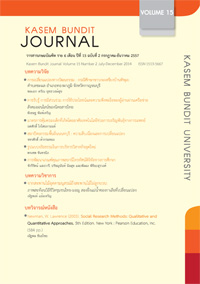รูปแบบจริยธรรมในการบริหารวิสาหกิจยุคใหม่
Keywords:
รูปแบบจริยธรรม, การบริหารวิสาหกิจยุคใหม่, Ethical model, Modern enterprises managementAbstract
วัตถุประสงค์ของการวิจัยเพื่อศึกษาหลักการบริหารวิสาหกิจยุคใหม่ องค์ประกอบของจริยธรรมในการบริหารวิสาหกิจยุคใหม่ และรูปแบบจริยธรรมการบริหารวิสาหกิจยุคใหม่ โดยใช้วิธีการวิจัยแบบผสมผสานทั้งการวิจัยเชิงปริมาณและการวิจัยเชิงคุณภาพ โดยใช้การวิจัยเชิงปริมาณเป็นหลัก ประชากรที่ใช้ในการวิจัยมาจากผู้บริหารและพนักงานระดับปฏิบัติของบริษัทจดทะเบียนที่มีผลการดำเนินงานยอดเยี่ยม ตามกฎเกณฑ์ของตลาดหลักทรัพย์แห่งประเทศไทย กลุ่มตัวอย่าง 340 คน เครื่องมือที่ใช้ในการวิจัย ประกอบด้วย แบบสอบถาม และแบบสัมภาษณ์เชิงลึก
ผลการวิจัยพบว่า ภาพรวมและรายด้านของหลักการบริหารวิสาหกิจยุคใหม่อยู่ในระดับมาก ประกอบด้วย หลักธรรมาภิบาล หลักการปฏิบัติที่ดีที่สุด และองค์ประกอบจริยธรรมในการบริหารวิสาหกิจยุคใหม่ตามหลักศาสนา พุทธ คริสต์ อิสลาม และขงจื้อ รูปแบบจริยธรรมในการบริหารวิสาหกิจยุคใหม่ ได้แก่ มีความขยัน ยอมรับและแสวงหาการเปลี่ยนแปลง มีความซื่อสัตย์ต่อตนเองและผู้อื่น มีความเป็นเอกภาพ มีความคิดสร้างสรรค์ และมีความเป็นสากล การทดสอบสมมติฐานการวิจัย พบว่า หลักการบริหารจัดการองค์กรยุคใหม่ ได้แก่ หลักนิติธรรม หลักความคุ้มค่า และหลักปฏิบัติที่ดีที่สุด เป็นตัวแปรที่มีผลต่อรูปแบบจริยธรรมในการบริหารวิสาหกิจยุคใหม่ และองค์ประกอบจริยธรรมในการบริหารจัดการองค์กรยุคใหม่ตามหลักจริยธรรมของศาสนา ได้แก่ หลักจริยธรรมของขงจื้อ หลักจริยธรรมของศาสนาคริสต์ เป็นตัวแปรที่มีผลอย่างมีนัยสำคัญต่อรูปแบบจริยธรรมในการบริหารวิสาหกิจยุคใหม่ (P‹0.001)
The objectives of this research were to study the principles of modern enterprises management, the ethical elements in modern enterprises management, and the ethical model for modern enterprises management. The research used both quantitative and qualitative methods, the main method being quantitative. The population studied were the executives and operational level staffs from three best performing companies according to the rules of the Stock Exchange of Thailand (SET). A sample of 340 people was employed for data collection. The instruments used in this research were a questionnaire and an in-depth interview form.
It was revealed that the ethical principles for modern enterprise management, both at the overall level and specific aspects, were at a high level and consistent with good governance principles, best practice principles, and religions principles of Buddhism, Christianity, Islam, and Confucianism. In addition, ethical issues for modern enterprises management were enthusiasm in work, acceptance and seeking of changes, honesty with oneself and with others, unity, creativity, and global ethical principles. Moreover, the hypothesis testing revealed that principles of the rule of law, and of efficiency, as well as best practice principles were variables that affected the ethical model for modern enterprises management. Finally, the the ethical elements in modern enterprise management that were mostly derived from ethical principles in Confucianism and Christianity were variables that significantly affected the ethical model for modern enterprises management (P
Downloads
How to Cite
Issue
Section
License
ทัศนคติ ความคิดเห็นใด ๆ ที่ปรากฏในวารสารเกษมบัณฑิตฉบับนี้เป็นของผู้เขียน โดยเฉพาะ มหาวิทยาลัยเกษมบัณฑิตและบรรณาธิการ ไม่จำเป็นต้องมีความเห็นพ้องด้วย







